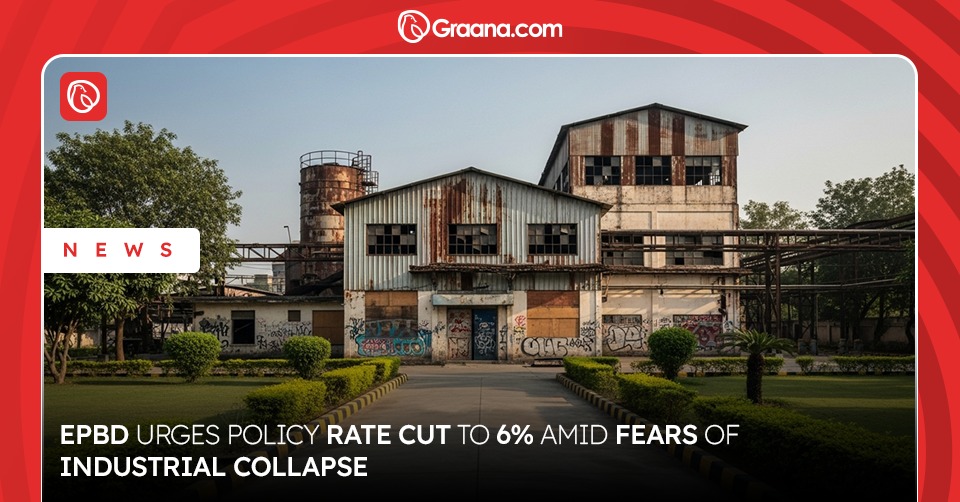
Source: Graana.com
LAHORE: The Economic Policy & Business Development (EPBD), an independent economic think tank, has called for an urgent reduction in Pakistan’s policy interest rate to 6% to revive industrial activity and stimulate economic growth.
Speaking to Dawn on Sunday, EPBD Chairman and former Commerce Minister Gohar Ejaz warned that Pakistan’s current 11% policy rate, despite a record-low inflation of 3.2%, results in an unsustainable real interest rate of 7.8%—the highest in the region. “This excessive real cost of capital is crippling businesses and threatens long-term industrial viability,” he cautioned ahead of the State Bank’s Monetary Policy Committee (MPC) meeting on July 30.
Ejaz criticized expectations of a modest 0.5–1% rate cut, calling it grossly insufficient to address the urgent crisis facing Pakistan’s manufacturing sector. While regional economies enjoy average policy rates around 5.5%, Pakistan’s rate is double, he noted, adding that this disparity, along with energy tariffs of 12–14 cents per kWh (compared to 5–9 cents regionally), severely undercuts competitiveness.
He pointed to stark contrasts: India’s lower real rate of 3.4% is aligned with projected 6.5% growth in 2026, whereas Pakistan is forecasted to grow at just 3.4%. “This differential has direct consequences on employment—Pakistan’s unemployment rate stands at 22%, compared to India’s 4.2%,” he said, attributing the disparity to high financing costs stalling industrial expansion.
Ejaz also highlighted Pakistan’s stagnant export-to-GDP ratio of 10.48%, far behind India (21.85%) and Vietnam (87.18%). He argued that the State Bank’s recent reserves growth—from $9.06 billion in June to $14.46 billion in July—was primarily funded through external borrowing and not from export earnings, reflecting deeper structural issues.
Pakistan’s monetary policy is out of sync with its fiscal goals, Ejaz added. With tax collection falling short of its FY25 target and ambitious projections for FY26, high interest rates are suppressing business activity—the very source of tax revenue.
“Businesses cannot remain profitable or generate taxes while paying double-digit borrowing costs,” he said. “The current approach ensures a cycle of fiscal shortfalls and economic stagnation.”
Ejaz also challenged the rationale behind keeping rates high to control imports, stating that previous trade deficits in 2017–18 and 2021–22 were driven by infrastructure, energy, and pandemic-related imports—not excessive consumption. “Interest rate hikes failed to curb these structural import drivers but successfully damaged the productive sector,” he asserted.
He called the high interest rates a major factor behind investment delays, job cuts, and declining capacity utilization, urging a reorientation of monetary policy in line with regional models like India and China, where lower real interest rates have supported growth and stability.
According to Ejaz, slashing the policy rate to 6% would immediately restore business confidence, reduce borrowing costs, support employment generation, and revitalize exports. It would also provide much-needed fiscal relief, with 59% of government debt in floating-rate instruments, potentially saving the treasury Rs3 trillion annually in debt servicing.
As the MPC prepares to announce its decision, Ejaz stressed that Pakistan must choose between continuing restrictive policies that suppress growth or adopting competitive monetary reforms that promote industrial revival and long-term prosperity.
Rawalpindi: The divisional administration has begun acquiring land for the Rs5 billion Thalian Interchange, a…
Islamabad: The Federal Board of Revenue (FBR) is preparing to seek approval from the International…
Riyadh: As Saudi Arabia’s Vision 2030 enters its third phase for the period 2026–2030, the…
Islamabad: The Capital Development Authority (CDA) has earmarked PKR 200 million to settle outstanding land…
Lahore: Punjab Governor Sardar Saleem Haider Khan has promulgated two key ordinances aimed at modernising…
Islamabad: Pakistan’s tax authorities are intensifying efforts to detect undeclared wealth by monitoring social media…